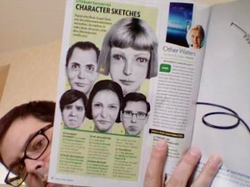 Brian Joseph Davis Brian Joseph Davis the author of Portable Altamont, a collection that garnered praise from Spin Magazine for its “elegant, wise-ass rush of truth, hiding riotous social commentary in slanderous jokes.” Slate called his novel I, Tania, “The book of your fever dreams.” A co-founder of the literary website Joyland, his short stories have been collected recently in Ronald Reagan, My Father and included in Against Expression: An anthology of conceptual writing (Northwestern University Press). His music and art productions have been acclaimed by Wired, Pitchfork, Salon, and LA Weekly, which wrote, “Davis has an amazing head for aural experiments that are smart on paper and fascinating in execution.” He’s written for Utne, The Globe and Mail and The Believer (forthcoming). He lives in Brooklyn and rural Ontario with his wife, Emily Schultz. Kathryn Mockler: What is your first memory of being creative (writing, art making, etc.)? Brian Joseph Davis: I saw a documentary on special effects when I was 7 and attempted to make my Kermit the Frog doll "animatronic" with old bike parts. Without the stuffing, and full of bike brakes, I thought he he looked deflated so I filled it toothpaste. That looked messy so I then attempted to "set things" by putting it in the freezer. I forgot about it there until my mom found a gutted Kermit the Frog doll full of gears and toothpaste. KM: How would you describe conceptual writing to someone unfamiliar with the genre? BJD: It's an umbrella term, but I'd say it's any writing with a formal concern--writing that starts from a certain point or a set of rules, almost like a game. That could include anything from Beckett to a Saturday Night Live parody. KM: How did you first get interested and involved with conceptual writing? BJD: I was creating this kind of work coming out of media art, with my inspirations being all over the map: JG Ballard, Kathy Acker, artists who work with text like Fiona Banner, Jenny Holzer. Little did I know that people like Darren Wershler or Ken Goldmsith on the East Coast, or Vanessa Place on the West Coast, were codifying conceptual writing. Their hard work has made it easier. KM: How would you describe your art/writing practice/process? BJD: When I do this kind of work I'm really looking for a kind of database of text. A good chunk of information that hasn't been exploited beyond its original use yet. KM: What artists/writers/poets would you recommended to someone aspiring to be an experimental or conceptual writer? BJD: I kind of hesitate to suggest a canon because this genre is a genre of practitioners. Like cheese making you only learn by doing so I'd suggest, find an idea and do it. Start with queso fresco. KM: What is your funniest literary moment? BJD: I was presenting "Johnny" in LA a couple of years ago, and afterwards a woman came up to me and said, I think you used lines from a script I wrote. KM: Your recent Tumblr project The Composites in which you create images "using law enforcement composite sketch software and descriptions of literary characters" is getting a lot of media attention. Why do you think that is? BJD: In North America, technology and culture have been in a 10-year sprint to forensicize everyday life far beyond the need of basic law enforcement. Internationally, of course, that has been the case much longer with Europe especially having to negotiate surveillance culture for decades. I’d also say that the combination of a law enforcement media and literature is a snapshot of inner space right at a time when literature is experiencing an ontological crisis. Writing’s struggle with digitization emulsifies well, it seems, with technology’s struggle with issues of privacy and security. KM: What are you working on now? BJD: Thank god, nothing.
 BRIAN JOSEPH DAVIS' MOST RECENT BOOK Ronald Regan, My Father, ECW Press/Independent Publishers Group, 2010 Description from ECW “An elegant, wise-ass rush of truth, hiding riotous social commentary in slanderous jokes…It almost feels like he’s leading a palace coup.” – Spin Magazine on Portable Altamont “Davis’ brilliant media deconstructions are pointed and hilarious at the same time.” – Kenneth Goldsmith “The book of your fever dreams.” – Slate on I, Tania The elderly take to the streets at night for illegal and cathartic electric scooter racing. (Think Two-Lane Blacktop but starring Abe Vigoda and Estelle Getty.) A copy editor suffers brain damage from West Nile virus and is suddenly filled with cannibalistic violence and award-winning minimalist poetry. (It’s a little like Awakenings, but directed by David Cronenberg.) Mayor McCheese visits a sexually repressed British couple in the early 1970s and touches their lives forever. (Okay, try this: Pasolini’s Teorema but with Mayor McCheese.) A Texas doctor transplants the mind of a meth-addicted convict into the body of a suburban web developer, resulting in America’s first “death-penalty case that turned into a custody case that turned into a right-to-die case.” (It’s like a hole drilled in your head and five HBO original movies poured in all at once.) Startlingly original but anchored by vivid characters, Ronald Reagan, My Father weaves all these ideas, and more, into a bleakly hilarious vision that’s both human and uncanny – as if Raymond Carver was marooned on Mars with ten hours to live. Comments are closed.
|
Rusty Talk
Rusty Talk Editor: Archives
November 2017
Categories
All
|


 RSS Feed
RSS Feed
